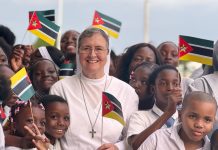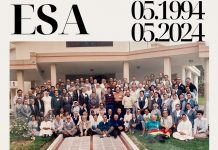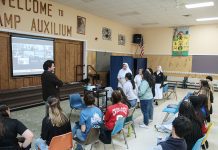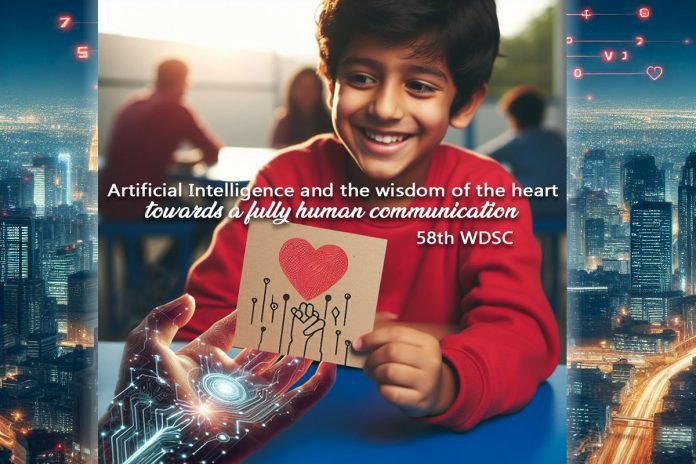Rome (Italy). On 24 January 2024, on the liturgical memorial of Saint Francis de Sales, patron of journalists and communicators, Pope Francis announced the Message for the 58th World Day of Social Communications (WDSC), which this year is celebrated in many countries on 12 May:
Artificial intelligence and wisdom of the heart: towards a fully human communication
The Holy Father recalls the very topical theme of artificial intelligence, on which he dwelt at the beginning of the year in his Message for the Worls Day of Peace, to propose the reflection on “a change that involves everyone, not only professionals,” arousing “enthusiasm and disorientation” and inevitably confronting basic questions:
“What is man, what is his specificity and what will be the future of this species of ours called homo sapiens in the age of artificial intelligence? How can we remain fully human and direct the ongoing cultural change towards the good?”.
Starting with the heart
Quoting the Italian theologian and writer Romano Guardini, who in the “Letters from Lake Como” states, “It is true that these are problems of a technical, scientific, and political nature; but they can only be solved by man,” the Pope indicates the perspective of approach to reflection, which “cannot but start from the human heart,” as “Only by endowing ourselves with a spiritual gaze, only by recovering a wisdom of the heart, can we read and interpret the novelty of our time and rediscover the way to a fully human communication.”
In continuity with the themes of the previous Days, “listening with the ear of the heart” and “speaking with the heart,” he then reaffirms the biblical meaning of the heart as a “place of freedom and the most important decisions of life”, “symbol of integrity, unity,” and “above all interior place of the encounter with God” and therefore of the wisdom of the heart.“ Wisdom of the heart, then, is the virtue that enables us to integrate the whole and its parts, our decisions and their consequences, our nobility and our vulnerability, our past and our future, our individuality and our membership within a larger community”.
Opportunity and danger
In bringing the concept of wisdom back to the technological world, he clearly affirms: “We cannot demand this wisdom from machines” and, while acknowledging that “No doubt, machines possess a limitlessly greater capacity than human beings for storing and correlating data, but human beings alone are capable of making sense of that data,” he observes that the word “intelligence” is misleading and that, rather than requiring machines that look human, it is necessary to “awaken humanity from the slumber induced by the illusion of omnipotence, based on the belief that we are completely autonomous and self-referential subjects, detached from all social bonds and forgetful of our status as creatures”.
It is the heart, therefore, to make a difference in technology and systems: “Depending on the inclination of the heart, everything within our reach becomes either an opportunity or a threat. Our very bodies, created for communication and communion, can become a means of aggression. So too, every technical extension of our humanity can be a means of loving service or of hostile domination”.
He also recalls the problems related to misinformation – from fake news, to deep-fake, to the creation and dissemination of false images that seem perfectly plausible, of which he happened to be the object, to other alterations and simulations of reality. While acknowledging the progress of the new frontier of generative intelligence, he warns about the possible risks and pathologies and that “It is important therefore to understand, appreciate, and regulate instruments that, in the wrong hands, could lead to disturbing scenarios,” since, “Like every other product of human intelligence and skill, algorithms are not neutral”.
He therefore reiterates the need to take preventive action and to implement ethical regulation for which he renews his appeal to the international Community “to forestall harmful, discriminatory, and socially unjust effects of the use of systems of artificial intelligence and to combat their misuse for the purpose of reducing pluralism, polarizing public opinion or creating forms of groupthink”.
Grow in humanity
“All of us are called to grow together, in humanity and as humanity.” It is a “qualitative leap”, the challenge that the Pope identifies to be up to “a complex, multi-ethnic, pluralist, multi-religious, and multicultural society.” Faced with the great possibilities of good linked to artificial intelligence, there is in fact the risk of the “datization” of people and reality, reduced to statistical calculations.
“The digital revolution can bring us greater freedom,” but it can also make us prisoners of echo chambers that echo their views and interests. “It is unacceptable that the use of artificial intelligence should lead to groupthink, to a gathering of unverified data, to a collective editorial dereliction of duty,” is the cry of Francis, who sees the risk of damaging humanity itself, with information separated from the existential relationship, which “involve correlating not only data but also human experiences; they require sensitivity to faces and facial expressions, compassion and sharing”.
He does not fail to turn his thoughts to world conflicts and the “parallel war” through disinformation campaigns, and to reporters who are injured or die in the field to document what they see, “For only by such direct contact with the suffering of children, women and men, can we come to appreciate the absurdity of wars”.
The message for the 55th WDSC – ‘Come and see’ (Jn 1:46) comes to mind. Communicating by meeting people where and how they are, in which he exhorted to a “journalism on the field.” Today he glimpses the positive contribution of artificial intelligence, only “if” it will accompany the journalists without annihilating them, enhancing professionalism and empowering them with its critical capacity.
Questions for today and for the future
Pope Francis leaves some questions that are very spontaneous as indicators of real critical issues raised in the various professional fields related to communication, information, publishing, documentation and the transmission of knowledge, and the free expression of thought. How do we prevent sources from being reduced to one alone, thus fostering a single approach, developed on the basis of an algorithm? How instead do we promote an environment suitable for preserving pluralism and portraying the complexity of reality? How can we make sustainable a technology so powerful, costly, and energy-consuming? And how can we make it accessible also to developing countries?
“The answer we give to these questions is not pre-determined; it depends on us. It is up to us to decide whether we will become fodder for algorithms or will nourish our hearts with that freedom without which we cannot grow in wisdom,” concludes the Pope appealing to human responsibility and to the free exercise of one’s faculties to ‘nourish’ the heart.




















